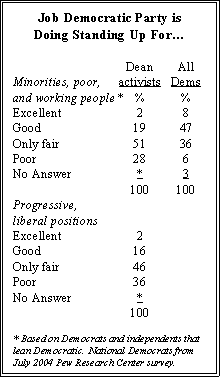
Given their numbers, their highly visible role in the 2004 campaign, and their generally strong commitment to political activity, the attitudes of Dean activists toward the Democratic Party will help shape the party’s future direction. The Dean activists are highly critical of the Democratic Party in a number of areas. But they are not ready to give up on the party rather, they want it to reflect, to a much greater degree, their own liberal and progressive positions.
Fewer than a quarter of Dean activists (21%) said the party has done an excellent or good job of standing up for its traditional positions on such things as protecting the interest of minorities, helping the poor and needy, and representing working people. By contrast, Democrats nationally have a much more favorable view of the party’s performance in this regard. In a Pew survey last July, nearly half of Democrats and Democratic-leaning independents (49%) said the party was doing an excellent or good job of standing up for minorities and the poor.
Dean activists voice disappointment with the party’s efforts as an advocate for progressive and liberal positions. Just 18% rate the party’s efforts in this area as good or excellent; most believe the party has done only a fair (46%) or poor (36%) job of promoting progressive positions.
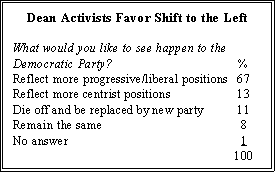
In addition, Dean activists overwhelmingly fault Democratic leaders for going too easy on the president. More than eight-in-ten (86%) said the party has not been critical enough of Bush and his policies. Just 12% said Democratic leaders have criticized Bush the right amount.
Change the Party, Don’t Destroy It
Looking at the party’s future, Dean activists voice strong sentiment for the Democrats to move to the left. Two-thirds (67%) want the Democratic Party to reflect more progressive or liberal positions, while just 13% would prefer a shift to more centrist positions.
Only about one-in-ten (11%) support the more radical approach of letting the Democratic Party die off and be replaced by an entirely new political party. But maintaining the status quo also is seen as unacceptable; just 8% of Dean activists want the party to remain more or less the same.
These attitudes contrast sharply with the opinions of both Democratic officials and rank-and-file Democrats. A Gallup poll of Democratic National Committee members (in February 2005) showed that, by more than two-to-one (52%-23%) the DNC members want the party to become more moderate, rather than more liberal. That view is shared by Democrats nationally; in a January survey, Gallup found that 59% of Democrats wanted the party to take a more moderate course.

Expanding the Democratic Base
Dean activists say the Democrats’ most important political objective should be to broaden the party’s appeal to middle-class parents. Roughly six-in-ten (59%) rate that as a top priority. Smaller but sizable minorities also believe the party should reach out to blue-collar factory workers (44% top priority) and working-class southern whites (39%) a group that Dean himself has said the party should target. There is less interest in appealing to the military (24%) and evangelical Christians (10%), groups well outside the mainstream of traditional Democratic constituencies.
Education is a factor in these opinions. The small percentage of Dean activists who have not attended college only about 4% overall place much greater priority on appealing to blue-collar workers than do college-educated Dean activists (62% vs. 43%). The non-college group is also more likely to say it is important for the party to appeal to working-class southern whites (48%) and members of the military (41%).

Positive View of ‘527s’
Despite holding mixed views about Kerry, the vast majority of Dean activists (88%) feel liberal and progressive causes would have been better served if he had won the election. While many of the activists are vowing to intensify their own political efforts in the wake of Bush’s victory, they also feel Bush’s reelection will generally increase support for liberal causes. Two-thirds (66%) said Bush’s reelection will boost support for liberal causes, while 32% said it will decrease support for those causes.
Dean activists are divided over how best to champion liberal and progressive goals. Roughly four-in-ten (38%) think the Democratic Party itself can be most effective, but nearly as many (36%) think these issues can best be advanced by privately funded advocacy groups, such as the so-called “527” organizations that played an important role in the 2004 campaign. Smaller numbers think liberal causes would be most effectively advanced by a new political party (13%) or other, unspecified groups (12%).
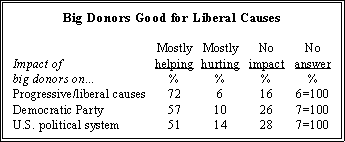
The 527 groups have a positive image among Dean activists 55% approve and 41% disapprove.
These groups have drawn much of their financial support from activist philanthropists. On the Democratic side these include donors such as George Soros, Peter Lewis and Andy Rappaport. Dean activists view these philanthropists as mostly helping (72%) rather than hurting (6%) liberal causes, or having no impact (16%). A sizable majority (57%) also believe that these philanthropists are mostly helping the Democratic Party, compared with 10% who say they are mostly hurting the party and 26% saying they have no impact. Half (51%) judge these big donors as helpful to the U.S. political system in general.
Third Party Favored
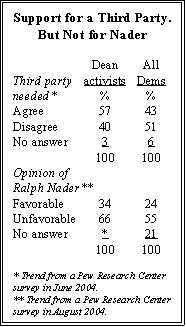
Dean activists believe the country should have a third major political party, but most also want the Democratic Party to survive. In the September survey, 65% of Dean activists favored the creation of a third major political party, a number that declined a bit in the follow-up survey in November (to 57%).
This view is not shared by Democrats generally. In June, 43% of Democrats said the country should have a third major political party while 51% disagreed. Independents typically express greater support for a third party than do either Republicans or Democrats. In the June survey, 66% of independents said the nation should have a third political party, which is higher than the percentage of Democrats or Republicans who favor this idea (43% each).
Though virtually all of the Dean activists voted Democratic in the last election, a sizable minority have a positive view of the Green Party. Roughly four-in-ten (42%) said they think of themselves as Green Party supporters, while 51% said they do not.
However, most Dean activists have a negative opinion of Ralph Nader, who was the Green Party’s nominee in 2000 but failed to win that party’s endorsement in 2004. About two-thirds of Dean activists (66%) said they have an unfavorable opinion of Nader and just 1% said they voted for him last year. Democrats nationally also have low regard for Nader (55% unfavorable).
Candidates for 2008 Presidential Race
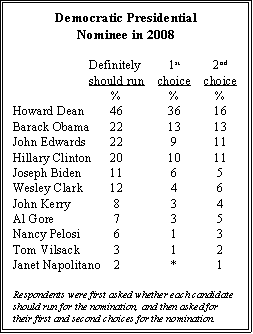
Looking ahead to 2008, most Dean activists believe that the governor should again run for president and among this group he is the early, if unsurprising, front-runner for the Democratic nomination.
Nearly half of Dean activists (46%) believe Dean should definitely make another try for the nomination, while another 33% say he probably should run. About one-in-five (18%) think Dean should not run.
Among other possible candidates, freshman Sen. Barack Obama draws strong support. As many say Obama should definitely run (22%) as say that about Sens. John Edwards (22%) and Hillary Clinton (20%), who are much better known. The possibility of presidential campaigns by the Democrats’ last two standard-bearers Sen. John Kerry and Al Gore generates minimal enthusiasm among Dean activists. Just 8% believe Kerry should definitely run, while 7% favor Gore running; roughly two-thirds of Dean activists think that Kerry and Gore should not make another try for the presidency (66% Kerry, 69% Gore).
Roughly a third (36%) rated Dean (who has since ruled out a presidential race in 2008) as their top choice for the nomination. Obama is second, at 13%, followed by Clinton (10%) and Edwards (9%). Just 3% rate Kerry as their first choice for the nomination, and the same number favor Gore.